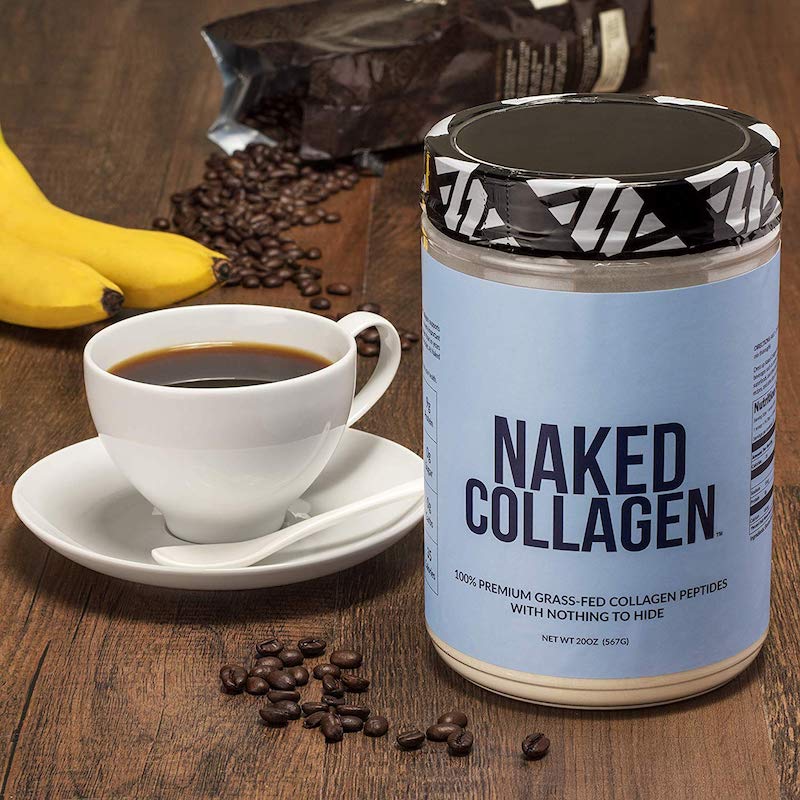If you've ever researched how to promote healthy hair growth, your search probably suggested many different hair products, vitamins, and supplements that might prevent hair loss and even stimulate growth. One of the products that likely came up in your search is collagen.
It may offer a variety of health benefits, such as promoting healthy, strong hair. But what expectations are reasonable when taking collagen for hair growth? Keep reading to find out if collagen is suitable for you and your hair goals.
What is Collagen?
Collagen is one of the most abundant protein sources found in the body. Like other proteins, it is an essential component of structure and function in the body.
There are 28 different types of collagen known to scientists. Up to 90% of the collagen in the human body is type 1 collagen. Amino acids glycine, proline, and hydroxyproline make up the bulk of the collagen molecule. These amino acids build three strands, which make up the triple-helix structure characteristic of collagen.
Collagen is found in many parts of the body including cartilage, connective tissues, skin, bones, and tendons. It provides structural support for the body and facilitates important cellular processes including tissue repair, immune response, communication between cells, and tissue maintenance.
The body can produce collagen on its own, but around age 25, this production naturally starts to decline. Collagen production continues to decrease annually by about 1%.
How is Collagen Related to Healthy Hair Growth?
Collagen plays an important role in supporting skin elasticity, hair health and promoting thicker hair growth. The hair is made primarily of the protein keratin. Collagen contains the amino acids that are used to build keratin.
Collagen is also the main part of the dermis. The dermis is the thick layer of tissue below the epidermis which forms the skin under the surface and contains blood capillaries, nerve endings, sweat glands, hair follicles, and other structures.
Collagen is necessary for the repair of the dermis and the skin on the scalp at the root of the hair follicle, and it may impact hair follicle regeneration and growth with aging.
Can Collagen Supplements Improve Hair Health?
Research shows that collagen supplements may improve hair health in several different ways.
Collagen supplements provide amino acids that can be used to make keratin, a protein that makes up most of the hair follice. When you consume collagen supplements or other proteins, you body digests and breaks them down into amino acids. The amino acids are then used to make other substances and proteins in the body.
Collagen helps hair growth by providing 3 nonessential amino acids; proline, glycine, and hydroxyproline. Proline is the main component of keratin. Consuming proline-rich collagen should give your body the substances it needs to build healthy hair follicles.
Hair follicles can also be damaged by oxidative stress caused by free radicals. Collagen may have antioxidant properties that might counteract free radicals and prevent hair damage, but research is limited.
Oxidative stress also causes damage to cells that produce hair color and may cause rapid graying. Since collagen might act as an antioxidant, it could fight free radicals, preventing cell damage and slowing graying.
Lastly, collagen protects the dermis, the layer of skin that houses hair roots, so scientists believe that it may help prevent age-related hair loss and thinning. However, there is currently no research to support this.
How to Increase Collagen Naturally?

Nutrition and lifestyle choices play an important role in the health of your hair and skin. In general, eating whole foods most of the time – fruits, vegetables, whole grains, and healthy fats – can potentially prevent aging and hair loss.
To ensure your hair stays looking healthy and full, limit highly processed foods with added sugar and saturated fat. Limit snack foods and processed meats. Fill your diet with fresh, whole foods to stay looking young and healthy.
Foods That Increase Collagen Production
Animal proteins are a great source of dietary collagen. Other plant-based foods, like citrus fruits and garlic, contain vitamins and other compounds that help your body produce collagen on its own.
Vitamin C plays a significant role in the production of pro-collagen, the body’s precursor to collagen. To help your body produce collagen optimally, getting enough vitamin C is critical.
Citrus fruits (oranges, grapefruit, lemons, and limes), berries, tropical fruits, tomatoes, and bell peppers are full of this nutrient.
Garlic contains sulfur, a trace mineral that helps synthesize and prevent the breakdown of collagen. Here are some foods that are rich in collagen, or may help promote collagen production:
- Bone broth
- Chicken
- Fish and shellfish
- Egg whites
- Citrus fruits
- Berries
- Tropical fruits
- Garlic
- Leafy greens
- Cashews
- Beans
- Tomatoes
- Bell peppers
To give your body the best chance at producing optimal levels of collagen for hair growth, you can’t go wrong with collagen-rich animal foods or vitamin and mineral-rich fruits and vegetables.
A diet full of protein-rich foods, whether from plant or animal sources, can help provide your body with the amino acids necessary for collagen production.
Fruits and vegetables high in vitamins and minerals are also supportive of your hair goals. These foods contain other nutrients that aid the process of collagen production including zinc, vitamin C, and copper.
Lifestyle Choices for Optimal Collagen
Lifestyle choices can decrease collagen production and speed up the aging process. Avoiding things like smoking, excessive alcohol use, constant stress, excessive sun exposure, and poor sleep habits can give you a more youthful look.
If you smoke, talk to your doctor about options for quitting.
Try to limit alcohol intake to 1-3 drinks per week. People who limit their alcohol intake not only appear younger but also have a lower risk for cancer and other health complications.
Keep the stress in your life to a minimum. Chronically high cortisol levels can decrease collagen production. If you can’t currently limit the amount of stress in your life, find a way to manage it such as meditation, exercise, or therapy.
Wear sunscreen or limit the amount of time spent in direct sunlight. Ten to 20 minutes of direct sunlight 3-4 times a week provides adequate vitamin D for most people.
Make sure you get adequate sleep. Most people need about 8 hours of sleep per night. If you have difficulty sleeping, try setting a nightly routine to prepare your body and mind for restful sleep.
At What Age Should I Start Collagen Supplementation?
You can start taking a collagen supplement as a preventive measure in your early to mid-twenties. Instead, you may also start supplementing with collagen as soon as you start to notice any visible signs of aging.
If time is on your side, we recommend starting supplementation around the age of 20 to 25 to promote collagen production before the body’s naturally declines.
How Much Collagen Per Day for Hair Growth?
There is currently no RDA (recommended daily allowance) for collagen, but most research evaluating the benefits of collagen supplementation has studied doses ranging from 2.5 - 15 grams per day.
Modest doses, around 2.5 grams daily, may improve joint pain and promote skin health, hair growth, and hydration. Moderate doses of about 5 grams daily may potentially increase bone density, while larger daily doses of 15 grams may increase muscle mass and improve body composition.
Should I Take Collagen for Hair Growth? The Verdict
Taking collagen supplements may support and stimulate hair growth in several different ways.
Collagen supplementation is probably best suited as a preventative measure. If you have significant hair loss or hair breakage, supplementing with collagen may not be enough to promote hair regrowth.
If you have good hair quality and want to promote and maintain healthy hair growth, collagen may be a good fit for you. Consider bone broth or collagen supplements that can be mixed into food or drinks.









